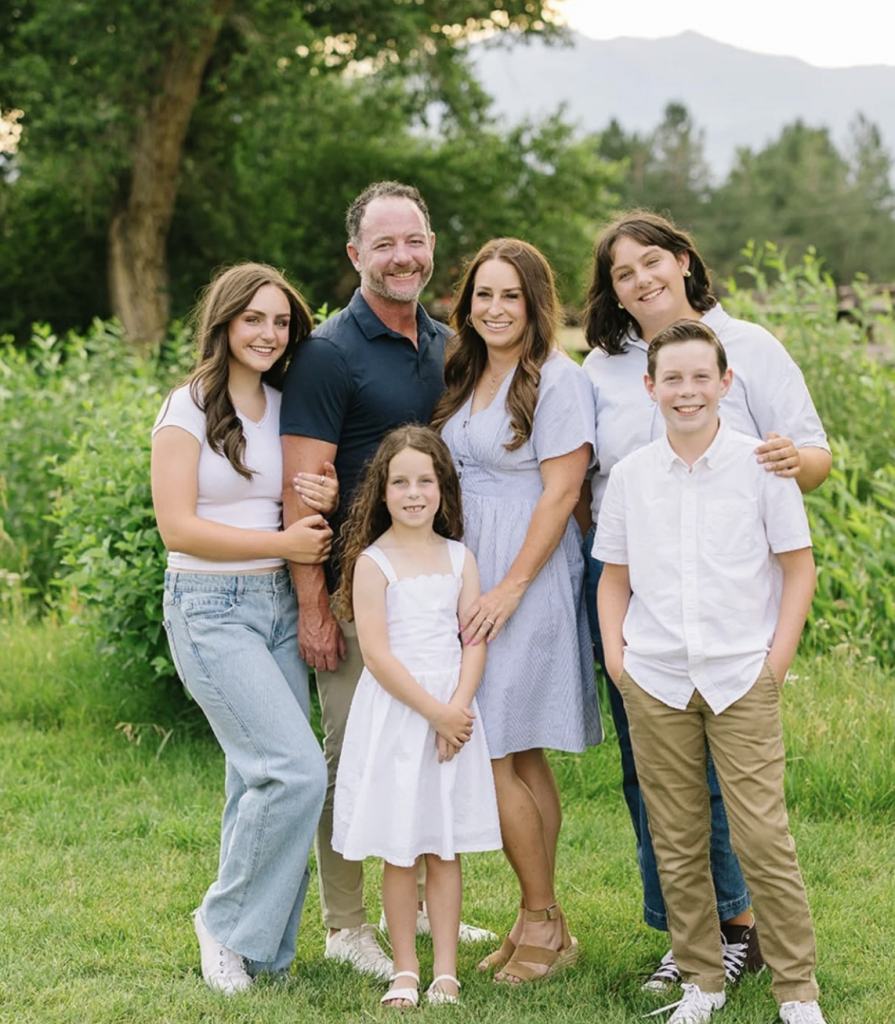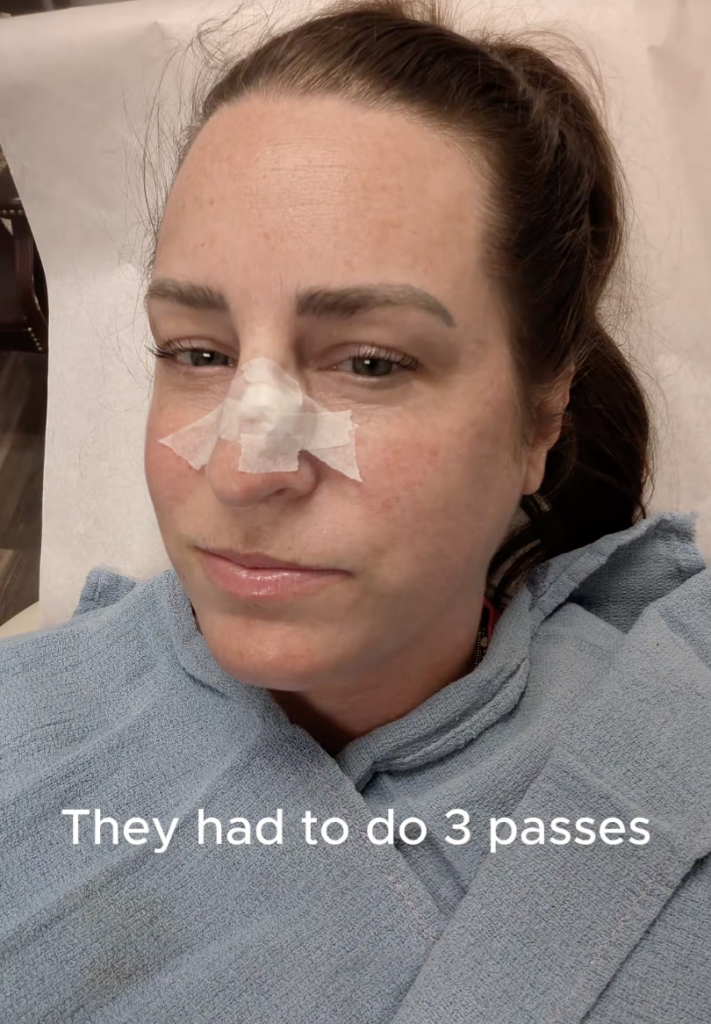As a woman in the skincare business, Amanda Anderson, 43, said she was “obsessed” with sunscreen and staying in the shade, so it was “a gut punch” to realize her dry spot on her nose, that had been bothering her for months, was actually skin cancer — and if she hadn’t gone in for a second opinion, she may not have caught it in time.
In January, the creative entrepreneur and founder of On the Go Goodness — noticed a “small, irritated spot” of dry skin, but shrugged it off as a simple casualty of winter weather. Six months later, as PEOPLE reported via SWNS, Anderson addressed the issue with a dermatologist, who said it looked fine and sent her home with a cream.
Read More
RELATED: Second Opinions on Your Cancer Diagnosis or Treatment: Do You Need One?
Sharing her journey on TikTok, she said it was a “HUGE SHOCK,” what she went through, and encourages others to “WEAR YOUR SUNSCREEN!!”
@onthegogoodness WEAR YOUR SUNSCREEN!! I had a small irritated spot on my nose for 6 months. I finally went into the dermatologist. It wasn’t a huge shock to find out it was Basal Cell Carcinoma. Getting it removed was a HUGE shock. I had no idea what I was getting into! I’ll be sharing all the details from my first few weeks of hearing. #basalcellcarcinoma #skincancer #mohs #mohssurgery #wearsunscreen #skincare #skincancerawareness
Anderson detailed her Mohs surgery, which her doctors needed “3 passes” at to get all the cells. Mohs surgery is a microscopically-controlled surgery where thin layers of skin cancer tissue are removed until the surgeon reaches clear tissue.
“The damage is done when you’re young,” she warned, adding that she educates her daughters to use skin protection under their makeup.

Luckily, Anderson confirmed via TikTok that she will not need any further treatment, and will continue to go in for check-ups every six months. The lifestyle influencer is determined to share her story to help others, especially her daughters, avoid having to go through something similar or worse.
“I’m trying to build healthy habits in my kids,” Anderson added. “People don’t realize you can get sunburnt through the window of a car. We have to take care of our skin like you would your teeth. Skin cancer is so preventable.”
Top 5 Skin Cancer Prevention Tips
When it comes to skin protection, we can never have enough reminders.
In a conversation with SurvivorNet, dermatologist Dr. Dendy Engelman, a board-certified dermatologic surgeon and an associate at Manhattan Dermatology and Cosmetic Surgery, shared her top tips for preventing skin cancer.
- Get an annual skin check from a professional. While watching for changing moles and new skin lesions is good advice, in addition, “we need to make sure that we have yearly skin checks because it’s difficult to evaluate areas all over the body,” Dr. Engelman said. “So, we need to get a professional to make sure that we’re monitoring everything.”
- Wear a sunscreen with an SPF of 30 or higher year-round, she added.
- Avoid sun during peak hours (between 10 a.m. and 2 p.m.).
- Don’t forget to protect eyes: Wear sunglasses.
- And finally, avoid tanning beds at all costs. If you’re looking for a healthy glow, sunless tanner is safest the way to go.
Dr. Dendy Engelman’s Top 5 Tips To Protect Your Skin From Skin Cancer
What Is Mohs Surgery?
Mohs surgery is one of the primary treatment options for basal cell carcinoma (BCC), a common type of skin cancer. When a someone undergoes surgery for BCC, it typically involves the following steps:
Diagnosis: Before surgery, a dermatologist or skin specialist will diagnose the basal cell carcinoma. This is typically done through a skin biopsy, where a small sample of the affected area is removed and examined under a microscope to confirm the presence of cancerous cells.
Pre-operative evaluation: Once the diagnosis is confirmed, the patient’s overall health and the specific characteristics of the BCC, such as its size, location, and depth, are evaluated to determine the most appropriate surgical approach.
“You are able to remove a very conservative margin around the cancer and study it in essentially real-time,” explained Dr. Sumaira Aasi, Professor of Dermatology and Director of Mohs and Dermatologic Surgery at Stanford. If, when the surgeon examines the tissue under the microscope, cancer is found, the surgeon goes back and removes some more tissue.
Treatment for Basal Cell Carcinoma: Mohs Surgery
The idea is that by making the tiniest cuts and evaluating them microscopically, the surgeon knows for certain that all the cancer is out when the last piece of tissue proves to be clear. It is often done as an outpatient procedure with local anesthetic.
Reconstruction: Depending on the size and location of the surgical site, reconstructive surgery may be necessary to optimize cosmetic outcomes and restore the function of the treated area. This could involve sutures, skin grafts, or other techniques.
Post-operative care: After the surgery, patients are typically given instructions for wound care, which may include keeping the area clean, changing dressings, and avoiding sun exposure to prevent further damage to the skin.
Follow-up: Regular follow-up appointments are essential to monitor the surgical site for any signs of recurrence and to address any concerns or complications.
Questions to Ask Your Doctor
If you are diagnosed with skin cancer, you may have some questions for your doctor. SurvivorNet suggests some of the following to help you on your cancer journey.
- What type of skin cancer do I have?
- What treatment options exist for this type of cancer?
- Will insurance cover this treatment?
- Would treatment through a clinical trial make sense to me?
- What resources exist to help manage my anxiety because of this diagnosis?
“If I had any advice for you following a cancer diagnosis, it would be, first to seek out multiple opinions as to the best care,” National Cancer Institute chief of surgery, Dr. Steven Rosenberg, previously told SurvivorNet. “Finding a doctor who is up on the latest information is important, and it’s always important to get other opinions so that you can make the best decisions for yourself in consultation with your care providers.”
Learn more about SurvivorNet's rigorous medical review process.

